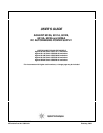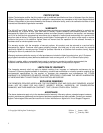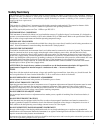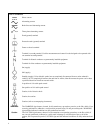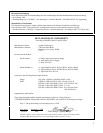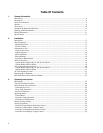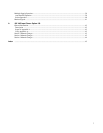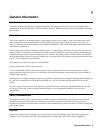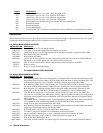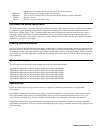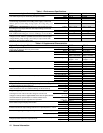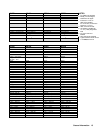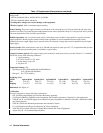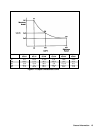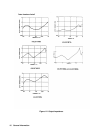
3
Safety Summary
The
f
ollowin
g
g
eneral sa
f
et
y
p
recautions must be observed durin
g
all
p
hases o
f
o
p
eration o
f
this instrument. Failure to
com
p
l
y
with these
p
recautions or with s
p
eci
f
ic warnin
g
s elsewhere in this manual violates sa
f
et
y
standards o
f
desi
g
n,
manu
f
acture, and intended use o
f
the instrument. A
g
ilent Technolo
g
ies assumes no liabilit
y
f
or the customer’s
f
ailure to
comply with these requirements.
GENERAL
This product is a Safety Class 1 instrument (provided with a protective earth terminal). The protective features of this
product may be impaired if it is used in a manner not specified in the operating instructions.
Any LEDs used in this product are Class 1 LEDs as per IEC 825-1.
ENVIRONMENTAL CONDITIONS
This instrument is intended for indoor use in an installation category II, pollution degree 2 environment. It is designed to
operate at a maximum relative humidity of 95% and at altitudes of up to 2000 meters. Refer to the specifications tables for
the ac mains voltage requirements and ambient operating temperature range.
BEFORE APPLYING POWER
Verify that the product is set to match the available line voltage, the correct fuse is installed, and all safety precautions are
taken. Note the instrument’s external markings described under "Safety Symbols".
GROUND THE INSTRUMENT
To minimize shock hazard, the instrument chassis and cabinet must be connected to an electrical ground. The instrument
must be connected to the ac power supply mains through a three-conductor power cable, with the third wire firmly
connected to an electrical ground (safety ground) at the power outlet. For instruments designed to be hard-wired to the ac
power lines (supply mains), connect the protective earth terminal to a protective conductor before any other connection is
made. Any interruption of the protective (grounding) conductor or disconnection of the protective earth terminal will cause
a potential shock hazard that could result in personal injury. If the instrument is to be energized via an external
autotransformer for voltage reduction, be certain that the autotransformer common terminal is connected to the neutral
(earthed pole) of the ac power lines (supply mains).
ATTENTION: Un circuit de terre continu est essentiel en vue du fonctionnement sécuritaire de l’appareil. Ne
jamais mettre l’appareil en marche lorsque le conducteur de mise … la terre est d‚branch‚.
FUSES
Only fuses with the required rated current, voltage, and specified type (normal blow, time delay, etc.) should be used. Do
not use repaired fuses or short-circuited fuseholders. To do so could cause a shock or fire hazard.
DO NOT OPERATE IN AN EXPLOSIVE ATMOSPHERE
Do not operate the instrument in the presence of flammable gases or fumes.
KEEP AWAY FROM LIVE CIRCUITS
Operating personnel must not remove instrument covers. Component replacement and internal adjustments must be made
by qualified service personnel. Do not replace components with power cable connected. Under certain conditions,
dangerous voltages may exist even with the power cable removed. To avoid injuries, always disconnect power, discharge
circuits and remove external voltage sources before touching components.
DO NOT SERVICE OR ADJUST ALONE
Do not attempt internal service or adjustment unless another person, capable of rendering first aid and resuscitation, is
present.
DO NOT EXCEED INPUT RATINGS
This instrument may be equipped with a line filter to reduce electromagnetic interference and must be connected to a
properly grounded receptacle to minimize electric shock hazard. Operation at line voltages or frequencies in excess of
those stated on the data plate may cause leakage currents in excess of 5.0 mA peak.
DO NOT SUBSTITUTE PARTS OR MODIFY INSTRUMENT
Because of the danger of introducing additional hazards, do not install substitute parts or perform any unauthorized
modifications to the instrument. Return the instrument to an Agilent Technologies Sales and Service Office for service and
repair to ensure that safety features are maintained.
Instruments that appear damaged or defective should be made inoperative and secured against unintended operation until
they can be repaired by qualified service personnel.



